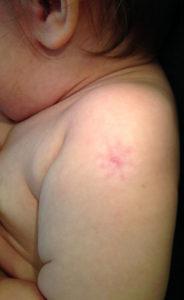Large numbers of infants still get infected with HIV during breastfeeding. Understanding what increases the risk of infection in these infants may aid in a decrease in HIV transmission. Researchers, led by Heather Jaspan, have found that Bacillus Calmette-Guérin (BCG) vaccine, which is usually administered at birth, increases the proportion of HIV target cells in HIV-exposed, uninfected infants. Delaying BCG vaccination may be beneficial in protecting these infants from HIV.
The BCG vaccine is a live-attenuated vaccine that is used to prevent extra-pulmonary TB. The vaccine is given to more than 100 million children throughout the world and is administered at birth. With the HIV pandemic came the concern about when to vaccinate HIV-exposed infants. The vaccine is safe and efficacious in HIV-unexposed infants, however, HIV-exposed, uninfected infants had altered immune responses to not only BCG but other childhood vaccines.
Research also suggested that BCG vaccination of HIV-exposed, uninfected infants may make them more susceptible to HIV infection as shown in non-human primate models. This led the team of researchers to investigate if this susceptibility was due to HIV-exposed infants having more HIV target cells after BCG vaccination. They performed a randomized clinical trial where South African, HIV-exposed infants were either given the BCG vaccine at birth or at 8 weeks. Monocyte, natural killer cell and CCR5+ CD4+ T cell frequencies were investigated. Immune gene expression was also analyzed.
The researchers found that CCR5+ CD4+ T cell frequencies were increased in HIV-exposed infants after BCG vaccination and these cells persisted for at least 8 weeks after vaccination. As these cells are HIV target cells, this could increase the risk of HIV acquisition through breastmilk in these infants. Infants vaccinated at 8 weeks after birth also had increased frequencies of these HIV target cells. The infants also had increased levels of CIITA (an MHC class II activator), IFN-α1 and IL12RB1 transcripts. The frequencies of innate immune cells was largely unchanged.
This study suggests that the time of administration of the BCG vaccine to HIV-exposed, uninfected infants is critical to ensure they are not at additional risk of HIV infection especially when breastfeeding. The benefits of BCG vaccination in this population should also be considered.
Journal article: Gasper et al., 2017. BCG vaccination induces HIV target cell activation in HIV-exposed infants in a randomized trial. Journal of Clinical Investigations
Article by Thandeka Moyo












